Last Dec, I was the opening keynote speaker at DevRelCon London 2019. As a DevRel professional, this was a fantastic opportunity to establish myself in the industry and to speak at a different region.
I shared about a 6-step Program Design Thinking framework (Slides here), inspired by the design thinking methodology, to designing programs that engage with developers.
I’m not ashamed to say that I’m very proud of how well I did - a handful of people complimenting my talk in person and my barely used Twitter account light up with so many positive comments. 🎉
Side note: My favorite compliment is from a gentleman who hated animations in presentations but said mine were tastefully and hilariously done.
But as my title suggests… I almost turned this opportunity down because of all the negative stories I told myself.
Inspired by a conversation with a friend, I want to share my story to help people who may go through the same journey as I did to feel less alone and to share some tips I used to overcome this negativity.
I wrote this also as a reminder to myself that sometimes, wonderful things can happen when I don’t give in to self-doubt. 😌
One big scary goal for 2019
I set myself a big scary goal very year. For 2019, I wanted to establish myself as a DevRel professional by speaking at an industry conference.
Public speaking isn’t scary for me since I’ve spoken many times outside of my job at Facebook. What was scary was that I’ve never spoken about any DevRel-related concept that I created despite being a Developer Program Manager professionally for 3 years.
It was particularly nerve-wracking because my speaking experiences are on my startup/failure experience, experience as a woman in tech, or programs that TechLadies offer - it’s very personal or very factual, nothing debatable, unlike presenting an idea or concept.
So while I put in a lot of effort to craft a talk proposal, I was nervous when I received the email that they accepted my talk. There were a lot of thoughts that crossed my mind, such as…
Has someone covered the same topic before?
While I like to think I have something useful to contribute, I wonder if my content is really that unique, if it makes sense, or worse, if someone has shared something similar.
Even though I swear I came up with this 6-step Program Design Thinking framework myself, part of me wasn’t sure if I’ve creates something unique or have unknowingly copied someone’s idea.
How would the audience feel about my talk?
In my brief career as a Developer Programs Manager, I’ve only been to one other DevRel conference in Singapore. I have a very limited idea of how my content stacks up with talks by other speakers in the industry.
One of my worst fear was how people may react to my talk publicly. Folks in the tech industry are big on Twitter, and people can be vocal there. I wasn’t sure if people would mock me publicly if my talk didn’t go well and I don’t know how to recover mentally and emotionally if that happened to me.
Will the audience understand me?
In all of my public talks, I like to make my audience laugh. Humor is important to me because I feel like I’ve done some good when I make someone momentarily forgets all the problems they face in life and just laugh.
Unfortunately, humor is culture-specific - something funny in one culture may not always translate well in others. I wasn’t sure if I could be funny in the European context. I wasn’t even sure if people can understand my Singaporean accent. There’s totally a chance that I could be perceived as someone speaking with an unfamiliar language who occasionally laughs at her own jokes.
Is this going to be worth my time and money?
Speaking at an overseas conference, especially ones organized by grassroots communities, requires a financial on top of the time commitment for travel and preparation. Since I wanted to own the IP of my slides, I didn’t want to represent my employer for this conference. That means I bore all* expenses and had to request for paid time off to speak.
Flying between Singapore to London isn’t cheap, and London isn’t a cheap city. Plus, the week that DevRelCon London took place clashed with one of the largest events of a developer program I led at Facebook. I had to plan out my finances and workload to speak at DevRelCon London, eat all fish & chips in London, and fly to Vietnam for work (and eat all the spring rolls) with no hiccups.
I wasn’t sure if this would be worth it.
To go or not to go
When I weighed the financial, professional, and psychological risks, I got very close to making a lame excuse on why I could no longer speak at DevRelCon London 2019, purely out of fear. Fortunately, there was still some rationality in me that mitigated my fears.
Here are what I did to decide on my participation and to prepare for DevRelCon London.
Trust the organizers’ decision
One thing that helped me boost my confidence to speak at DevRelCon London was that I didn’t misrepresent myself and my talk in the proposal. I’ve explained what I want to talk about, I’ve given my LinkedIn profile, and I didn’t lie about my experiences.
Knowing that the organizers have done DevRelCon a handful of times and still picked my talk meant that I have something valuable to share. So having the “am I good enough” narrative running through my head almost seemed disrespectful to the organizers’ decision in picking my talk, as it implied that I doubt their intellect and domain expertize in picking talks.
Do my research
Researching previous DevRelCons addressed my doubts on my content’s uniqueness or if people can understand my accent. Between the time when I received my acceptance email and confirming my spot, I watched almost all videos of the past DevRelCons. Doing so helped me with two things:
- I have a better understanding on what content they shared before and how fresh my content is
- I have a better picture on what is the expected presentation style, understanding if speakers speak sternly or being casual is okay, and the range of accents past speakers have.
Fortunately, I didn’t find any content that is close enough to the 6-step Program Design Thinking framework that anyone could claim plagiarism, and the range of accents past speakers have was very broad. My accent is fine as long as I don’t go full Singlish.
Weigh my opportunity cost
Like every big-ish decision, I created a list of pros and cons to help me decide if speaking is an excellent investment of my time, money and energy:
Having a space to meet fellow DevRel professionals and doing something that scared me were the biggest driving forces on why I should speak at the conference, and what tipped the scale for me was that they recorded the talks.
DevRelCon produces great quality recordings with transcripts, and they publish each talk as an article on the site. I felt good about it because it means that my talk has an impact beyond the conference and I need not feel bad if only a few people showed up to my session physically.
About a week after I confirmed my participation, I learned that I’m doing the opening keynote, in front of >200 DevRel folks. This added quite a lot of stress on me, but oh well. 🤷🏻♀️ Since I’ve already booked my flights and accommodation, the only logical next step is to...
Rehearse EVERYTHING
I’ve done my research, did my deck, wrote an entire script down right to the jokes (Yea, I write all my jokes), and everything else is just practice, practice, practice.

I sent my boyfriend a clip of my rehearsing and he made me "hold" a pineapple because of my hand gestures. 😂
I record or film all of my rehearsals and fine-tuned my gestures, timing, script, movement, pronunciation, and intonation until I like what I’ve created. Since I’m not live-coding, I had no intentions of hiding behind the podium.
I also did some full-dress rehearsals, practicing my presentation in the outfit I’ve chosen, to make sure I’m comfortable with an outfit that doesn’t hinder the way I move.
Choosing an outfit beforehand is not just for confidence or vanity, it has a practical reason - a lot of dresses don’t have pockets for the lapel mic transmitter. I must choose between using a handheld mic and not have any free hands after holding onto the clicker or wearing something that can support the weight of a lapel mic transmitter.
I also needed a top that I can clip the mic without my hair potentially brushing it and something that I can easily remove my layers if I get too warm from my nerves (nobody wants their sweaty pit stains caught on film). There was a lot of thought into picking what to wear.
Rehearsing was so important that I pretty much shut myself in my Airbnb to rehearse the moment I landed 3 days before the conference. I probably rehearsed my entire talk at least 15 times before I spoke.
Sending positive vibes
Come the day of the conference, I woke up feeling prepared after all that rehearsals but still nervous. I calmed myself down by telling myself “I will inspire, entertain, and be useful” repeatedly.
While I don’t believe in the Law of Attraction, I did it anyway because it’s free to do so and because it’s quite a nice thought to mediate on rather than “oh shit I will screw this up”.
And honestly, all that prep work and nerves had worn me quite a bit so I was looking forward to get it done and over with so I can enjoy the conference. 🤭
Wonderful things can happen when I don’t give in to self-doubt
My talk went beyond my expectations - I remembered my script so well that I could say words when my mind blanked out on stage, my jokes landed well, and the public comments were positive!
While I initially wasn’t sure if my talk could be useful, I later learned that it was useful to many people who were starting out on building a developer relations strategy for their companies and the framework I proposed gave them a structured way to think about their strategy.
So yea, a lot of my self-doubt were mitigated by research, practice, reasoning. This experience has taught me about the value of speaking on something I’ve learned, even though I’m not that tenured in DevRel work, because there are always newer newbies entering the field who may find my work helpful.
On that note, I hope you find some encouragement (or comfort in that your crazy self-doubt talk isn’t all crazy) to challenge yourself to speak at an event or conference this year.
Your voice is important, your voice is needed!
Like articles like this? I write about DevRel career advice, building communities, and designing developer programs. You can receive all my articles and more in your inbox when you sign up for my newsletter here: https://bit.ly/updatesfromsha
Resources I used to help me prep:
The Art of Story Design - Melinda Seckington
The Art of Slide Design - Melinda Seckington
Speaking at conferences: A complete guide - Cassie Kozyrkov

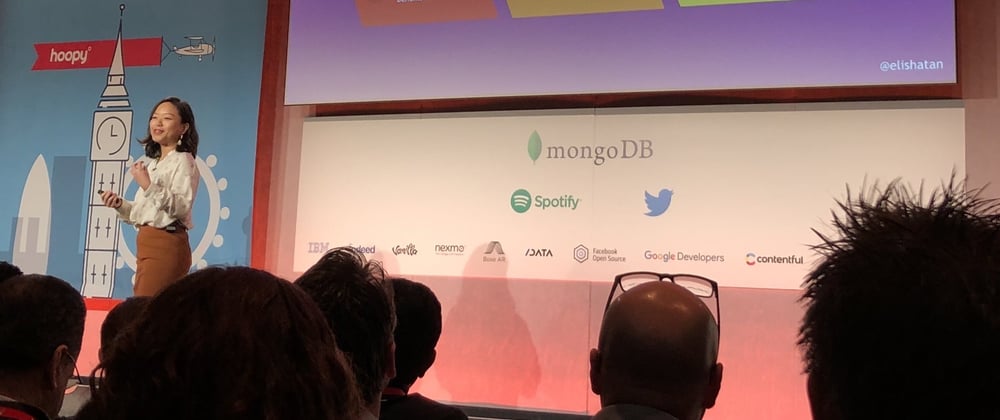
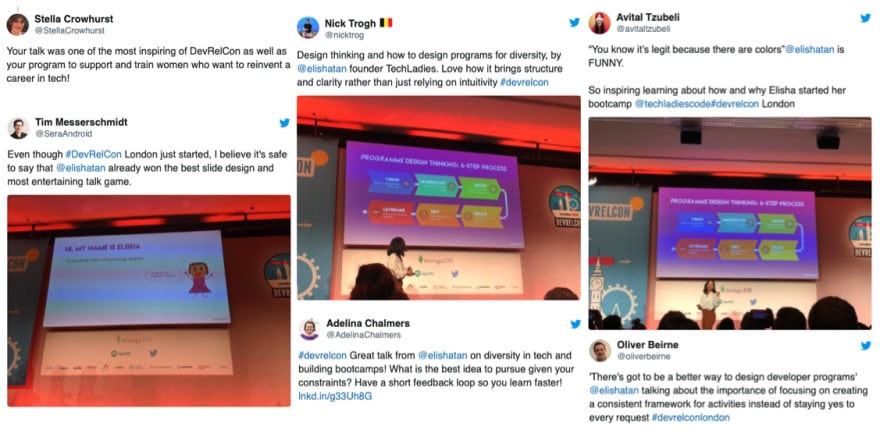
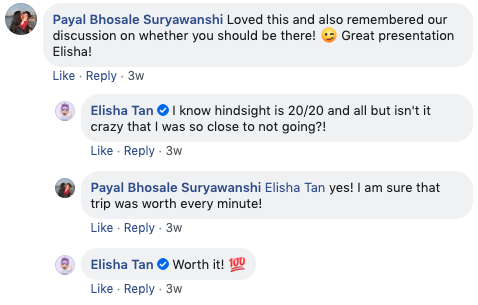

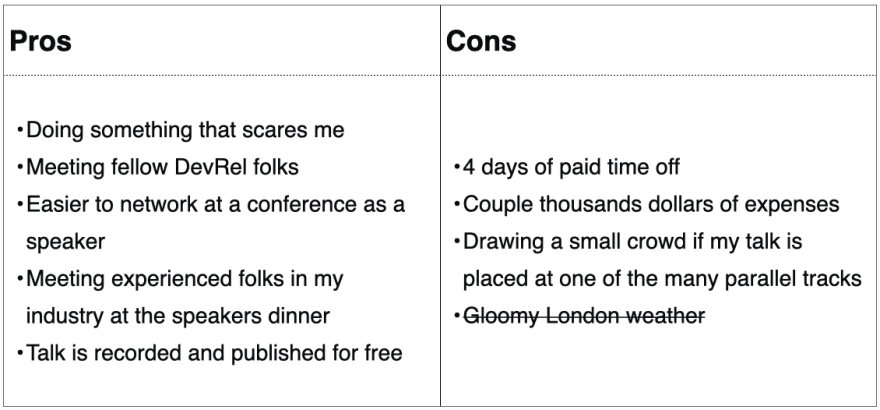
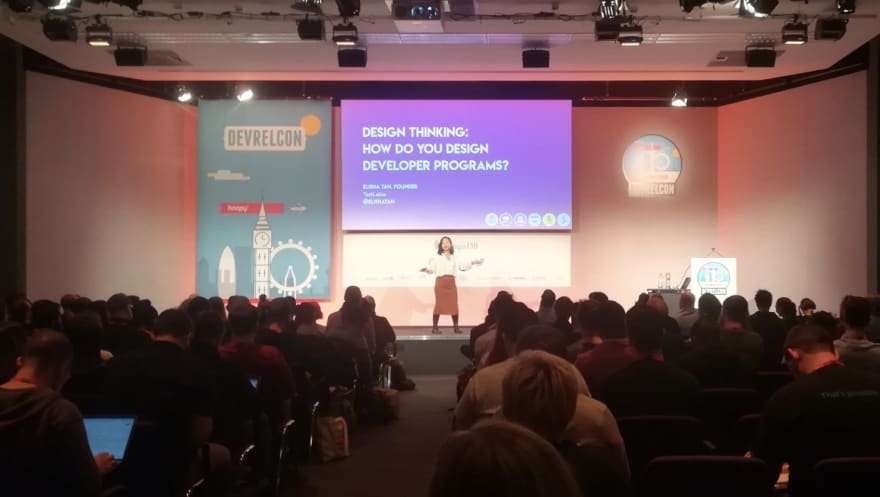





Top comments (4)
Impressive. Rehursing for more than 15 times? seriously? That's a lot of hard work.
I've seen you talk on stage before. You are always amazing.
"Never give in to self-doubt" - I will keep that in mind.
Thank you for sharing your thoughts Elisha.
I enjoyed your presentation and this is a very good read!! :) Thanks!
Never give in to self-doubt, great read!
Thanks for sharing this. I was there and I remember your talk very well: I thought it was excellent and very inspiring! I also love the idea of setting yourself a big scary goal every year 😃 👏